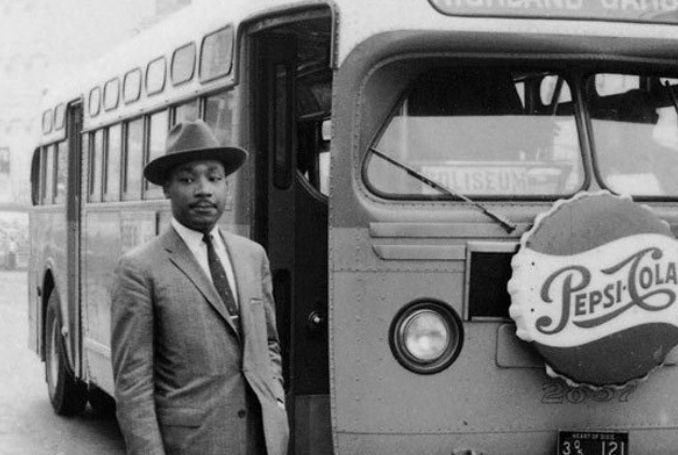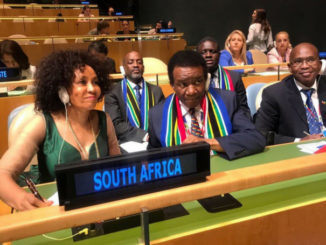
By Benay Blend
As Martin Luther King, Jr. (MLK) celebrations approach in honor of his birthday, there are the annual conversations about the presence of military recruiters at the MLK March in Albuquerque, New Mexico. Apparently, there are similar problems around the country. In the past, activists have blasted King’s anti-war speeches from their cars, enacted banner drops attesting to King’s opposition to the military, and presented letters to the organizers voicing their concerns.
My own feeling mirrors the reason why I no longer argue with Zionists: They (both Zionists and those who truly believe that King would support the presence of the military on his birthday) are determined to hold onto an ahistorical position, no matter how factually incorrect, so most likely will not listen to reason, regardless of how much the presenters speak the truth.
In the case of MLK, however, there is an educational aspect that could impact young people who see the military as a way out of poverty. In a country that demonizes activists like King while they are alive, then whitewashes them after their deaths, it makes sense that the youth do not learn about the radical MLK in their schools.
The theme of this year’s commemoration is The Beloved Community, a term first used by Josiah Royce, who founded the Fellowship of Reconciliation, then popularized by King to signify a global vision in which there would be no poverty, racism or militarism, what King designated as the three evils in this world.
The question remains, who is allowed space in the Beloved Community in 2022? A quick scan of the King Center’s sponsors for this event reveals that there are indeed some questionable choices. One sponsor, Chick-Fil-A, has been spotted on numerous occasions donating to anti-LGBTQ charities and organizations.
As for Coca-Cola, Ali Abunimah notes that the company is on the UN list of businesses profiting from the Israeli occupation of Palestinian land. The remaining list of sponsors includes corporations such as Bank of America, Porsche, and Lowe’s, among others, none of which would likely be all that comfortable residing in King’s Community.
The question remains, however, how would King feel about such corporations as Coca-Cola, given that it is said to profit from the very apartheid in Israel that he abhorred in South Africa, indeed, racism that he compared to the American South. Alas, despite Israel’s brutal occupation of Palestinians, King chose during his lifetime to side with the oppressor.
Other activists of his time chose a different path. Malcolm X and Kame Ture (Stokely Carmichael) denounced the Zionist state, even though it cost them support from comrades who lacked their courage. In “Zionist Logic” (1974) Malcolm X called out the fallacies that he saw in the Zionist justification for the Israeli state. Kwame Ture’s debate with an ardent Zionist was captured in 1973 and is available online.
King, too, showed valor when he spoke out against the war in Vietnam, for he knew that it would cost him support. So why did he choose not to extend his anti-imperialist position to Israel?
In an opinion piece written several years ago, journalist Michelle Alexander pondered this very question. “We can’t know for sure what King would do or think regarding Israel-Palestine today,” she writes, but she goes on to stress that “if we are to honor King’s message and not merely the man, we must condemn Israel’s actions.” Today, she continues, we can only “speculate” on what stance King might have taken regarding Palestine. If he had been given the chance to study the occupation as thoroughly as he did the Vietnam War, his conclusions might have been different. His conscience, like that of Alexander’s, might have left him no other choice.
While Alexander holds King accountable, she understands that his life was cut short before his position on Palestine could evolve. Not so politicians alive today who clearly put their careers first before their conscience.
“Although we understand that politicians too often waver and backpedal—because the system is such that keeping one’s job is predicated on playing a dirty game of betraying the weak and wretched to appease the powerful,” writes Susan Abulhawa, “activists must still be called to hold elected officials accountable for their transgressions.”
The most recent case she refers to is that of Jamaal Bowman, a black politician who ran against Zionist Elliot Engel. While Bowman’s early platform supported the Palestinian struggle, he later took that back, leaving the US Left, particularly the Democratic Socialists of America, divided about whether to continue their support of him or not.
“The reality,” Abulhawa claims, is that “leftist individuals and organizations often give a pass to politicians who align themselves with Israel against Palestine.” This happens more often, she continues, when the politician belongs to a marginalized community because it is hard to “square how such individuals could become promulgators of oppression and empire.”
“I don’t understand why some folks are suddenly surprised or disturbed over DSA’s surrender to the palpable “liberal” Zionist politics of Cong. Jamaal Bowman.,” tweeted radical lawyer Stanley Cohen. “They’ve done it time and time again, with excuse about growth and a better tomorrow.”
Regarding calls for “patience in the name of pragmatism,” Abulhawa concludes that “we should never concede the sacrifices our families make every day in Palestine for political convenience in the U.S. We can applaud, thank, and support politicians who take moral stands with us, but that cannot blind us to the moment when they align with and support racist colonizers engaged in the ongoing process of removing and replacing us with foreign colonizers in our ancestral homeland.”
Perhaps this is the real meaning of MLK’s Beloved Community. If it is to be truly global in scope, then all of us should be following the lead of Palestinian Americans and others who consider themselves colonized communities within the US. Borrowing a phrase that was prevalent before the last election, harm reduction at home means more harm to communities abroad, and that should concern everyone who commemorates King’s birthday this month.

– Benay Blend earned her doctorate in American Studies from the University of New Mexico. Her scholarly works include Douglas Vakoch and Sam Mickey, Eds. (2017), “’Neither Homeland Nor Exile are Words’: ‘Situated Knowledge’ in the Works of Palestinian and Native American Writers”. She contributed this article to The Palestine Chronicle.







